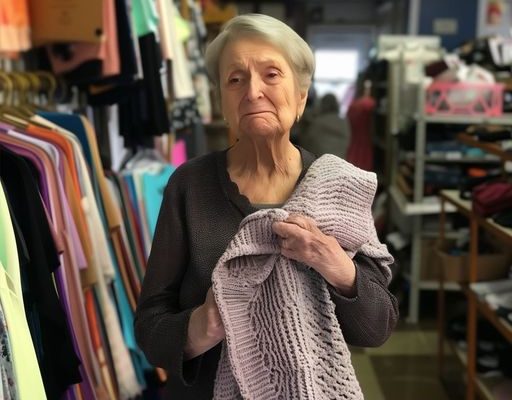My wife, Mary, is 73 years old, and she’s the sweetest person I know. Every Christmas and on their birthdays, she hand-knits special sweaters for our grandkids. For their birthdays, she would also make a plush toy for the little ones or a blanket for the older grandkids. She pours her heart into every stitch, spending hours to make sure each gift is perfect and unique.
Recently, we went to our local thrift store to browse around. As we walked through the aisles, something caught Mary’s eye. There, among the used clothes, were the sweaters she had lovingly made for our grandkids. My heart sank as I watched her face fall. She gently touched one of the sweaters she made for our oldest granddaughter, her fingers tracing the familiar patterns. She held back tears and reassured me that it was okay, saying she understood that kids might be embarrassed to wear grandma’s sweaters.
But I could see the pain in her eyes. Mary had put so much love and effort into those gifts, and seeing them discarded so carelessly was devastating. I was not as forgiving as she was. This was more than just a case of kids being kids—it was a sign of deep disrespect for the love and care Mary had shown them.
That very evening, I went back to the store, bought everything back, and prepared to teach my grandkids a lesson they wouldn’t forget.
The next weekend, we had a family gathering at our house. All our children and grandchildren were there, chatting and laughing. After dinner, I called everyone into the living room.
“I have something important to discuss,” I began, holding up the bag from the thrift store. “Your grandma has spent countless hours making these sweaters for you, out of pure love. Imagine how she felt when we found them for sale at a thrift store.”
The room went silent, and the kids looked down, embarrassed.
Mary stepped forward, her voice gentle but firm. “I never expected you to wear these all the time, but I hoped you’d appreciate them and understand the love that went into making them.”
I continued, “I’m not here to shame anyone, but to remind you all of the value of family and the effort we put into showing our love for you. These sweaters aren’t just clothes; they’re a piece of your grandma’s heart.”
One by one, the grandkids apologized, their eyes filled with regret. Our oldest granddaughter, Emily, stood up, tears streaming down her face. “I’m so sorry, Grandma. I never realized how much it meant to you. I promise I’ll cherish everything you make from now on.”
The other grandkids echoed her sentiments, and Mary, ever the kind-hearted woman, hugged each one of them, assuring them that she forgave them.
To drive the point home, I suggested a small ceremony where each grandchild would pick up their sweater and say something they appreciated about their grandma. It was a touching moment, filled with heartfelt apologies and promises to value the gifts they received. From that day on, the grandkids treated Mary’s handmade gifts with the respect they deserved. It wasn’t just about the sweaters anymore; it was about teaching them a lesson in gratitude and the importance of family. Mary’s heart began to heal, and our family grew closer, bound by a newfound appreciation for the love and effort that goes into every act of kindness.



